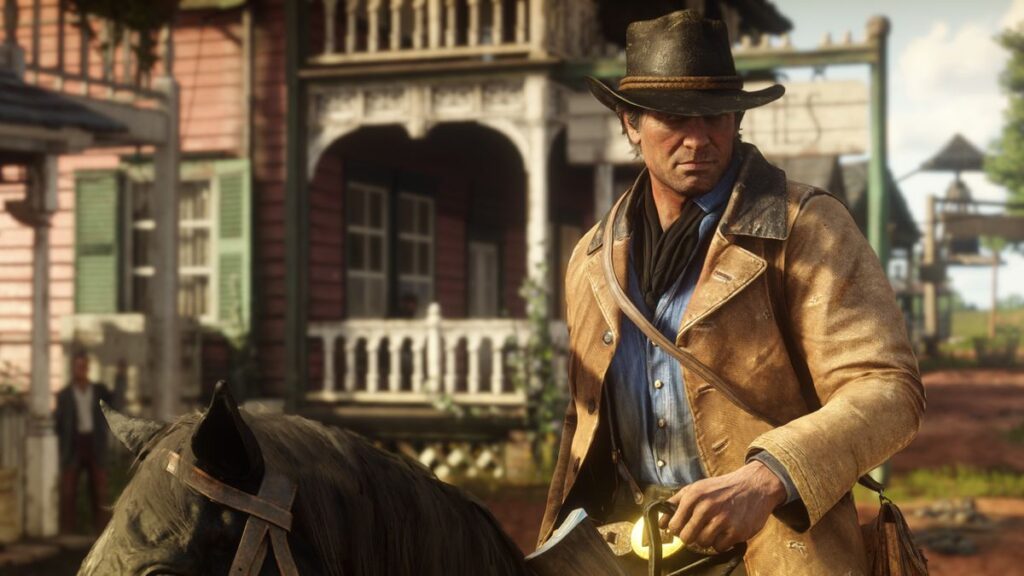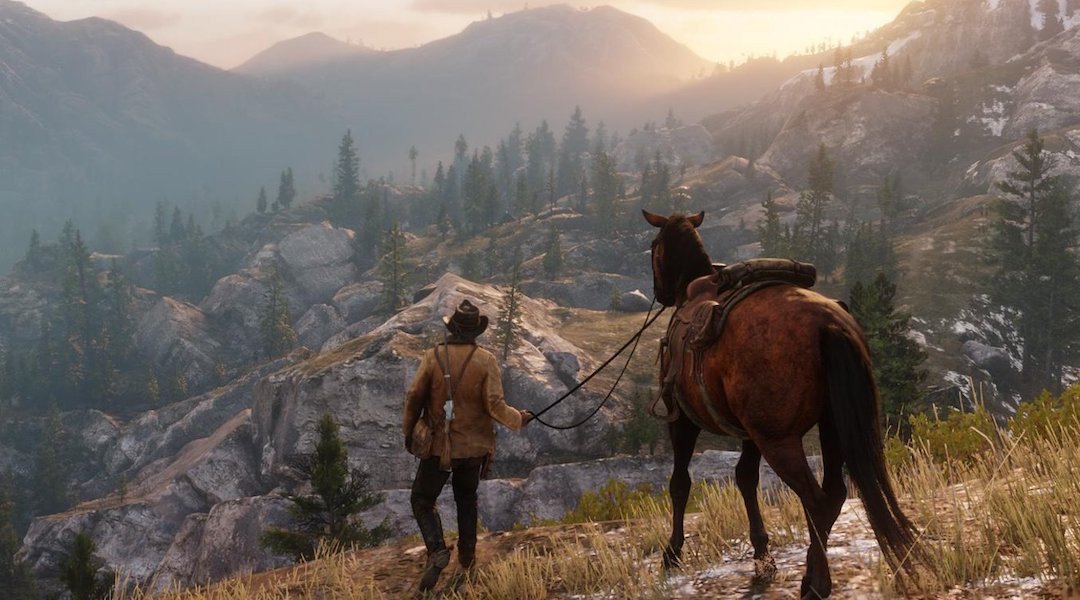
At most outlets that cover video games, the parallel pillars of news and reviews rarely meet. The news section reports on the business and culture of games while the reviews section studies the games themselves as independent texts, usually devoid of the larger context of the current events surrounding them. The reviews section focuses on what’s on the screen, the news section focuses on everything else.
That traditional separation came to a violent collision at many specialist and mainstream outlets last week with the release of Red Dead Redemption 2. What started as Rockstar co-founder Dan Houser’s off-handed comment to Vulture about “100-hour weeks” by employees quickly developed into blanket coverage of a culture of crunch at the company. Deeply reported insider accounts from Kotaku, Eurogamer, VentureBeat, and others detailed a workplace where 100-hour weeks may not have been the norm, but where many employees seemingly felt pressured (if not forced) to put in 50 or 60 hours a week for months on end.
Before the game’s review embargo broke last Thursday, Rockstar had already endured nearly two weeks of withering press criticism and in-depth coverage of the problematic work environment surrounding the making of Red Dead Redemption 2. It was a situation so big and important that many reviewers felt it couldn’t be ignored when evaluating the game itself.
“The Vulture piece, and the conversation around it, makes it impossible to ignore,” Waypoint’s Patrick Klepek told GameDaily. “It’s not just an elephant in the room, the room is this.”
Klepek, who took the media to task in a story headlined “The Industry Won’t Change If Reporters Let The Powerful Off the Hook,” told GameDaily it’s incumbent on the industry at large to take advantage of the focus this game is putting on this issue. “Our responsibility is to put this in perspective,” he said. “This is a moment when people are tuning in. I have friends to people who don’t read about video games, and they’re reading about Red Dead.”
“The media holds a very important position,” he continued. “We very occasionally get to talk to people who have a tremendous impact… when you’re given that moment, it’s incumbent upon you to try to take action.”
At Mashable, Adam Rosenberg addressed those non-traditional readers with a four-paragraph disclaimer atop his RDR2 review, headlined “Great art at great cost.” The disclaimer urges anyone “at all interested in playing RDR2, which I’ll say right now is a wonderful and expertly crafted game” to first read outside coverage “so you can better understand the circumstances under which it was made.”
“Pretty soon after that conversation [around Rockstar’s work culture] started I decided it would be a good idea to let our readers know that there are these external factors that they may not know about that they should,” Rosenberg told GameDaily. Since Mashable has a more mainstream audience than some other game-focused sites, Rosenberg said he wanted to make sure those readers were at least aware of the significant reporting that had been done on this issue.
“I’m always looking for ways to expose them to that stuff, in a way,” he said. “I thought it would be irresponsible to let it go unmentioned.”
Engadget’s Jessica Conditt expressed similar sentiments in discussing her hands-on impressions of the game, headlined “Separation of Crunch and Art,” which spent a full 15 paragraphs discussing Rockstar’s work environment before delving into the actual game itself. “When I sit with a game, I consider what thoughts are coming at me; what is interesting about this game,” Conditt told GameDaily. “When I was playing Red Dead, all I could think about was the crunch.”
Serious reporting on crunch’s effects on the industry are nothing new, dating back at least to coverage of 2004’s anonymous “EA Spouse” blog post (later revealed to be Erin Hoffman). But Conditt thinks the timing of Rockstar’s controversy, bumping right up against RDR2’s marquee release, helped push the issue front and center. “That kind of [100-hour work weeks] comment would have been fine six months ago, a year ago,” she said.”Then Telltale happened… We’ve known for practically decades at this point. The buildup has reached a tipping point and I think this is it.”
Kotaku’s Jason Schreier, who talked to nearly 80 current and former Rockstar employees for his massive report on Rockstar’s working environment, agreed that “this year for the first time it really feels like things are picking up steam… it feels like people care about this more than in the past. I’m sure part of it is just the climate of American politics and how terrible everything is.”
Kotaku’s review of RDR2, penned by Kirk Hamilton, weaves exquisite parallels between the game’s narrative and the wider narrative of workplace culture currently surrounding Rockstar. But Schreier told GameDaily he doesn’t think every review of the game necessarily needs to take that kind of wider critical tone.
“The debate we’ve been having forever is, ‘What is the purpose of a review?’” he said. “Is it a product guide… a decision making guide for customers? Or is it criticism that helps people reflect on their feelings about a game and makes people think about a game in a new way? I think Kirk’s review is a really good example of the latter.
“I don’t want to critique anybody for not mentioning work conditions in their review,” he continued. “But maybe there is an ethical question so I’m kind of torn on this. If you’re a big game site that your whole purpose is to talk about product reviews, should you have an ethical obligation also to talk about the fact that it was made under conditions that may have hurt people? I don’t know the answer to that. It’s going to have to depend on the game and the situation.”

If we’re judging games solely as technological products, the wider context of their creation might not be as appropriate in a review. “Even back when it was a major news headline, your typical iPhone review wasn’t delving into the plight of Foxconn workers and the horrific working conditions they faced,” Rosenberg wrote in a recent post on Facebook.
That said, Rosenberg notes game reviews have historically existed in an uneasy middle ground between “levers and knobs” technology evaluations and treatment as “artistic work that needs to be reckoned with on a number of levels.” And Rosenberg said that outside stories like the #MeToo movement in Hollywood have changed the way he thinks about considering the artists alongside the art.
“I can no longer watch a Kevin Spacey movie or a Louis CK performance without thinking about all those other issues,” he said. “It makes it problematic for me to watch those things. Every consumer of entertainment has to make their own decision in that regard, but for me the idea of separating the art from the artist can be a convenient excuse that carries its own problems.”
Klepek, who often advocates explicitly for labor causes at Waypoint, said he realizes that not all RDR2 reviews are going to make workplace issues front and center. That said, he thinks, “once you know it becomes incumbent upon you to go in with eyes wide open… all I really advocate for is to think about it, keep it in mind [as you play]. Don’t fall on the line of, ‘It’s irrelevant.’”
“That doesn’t mean it has to inform the criticism, but you have to keep it in mind,” he continued. “If you find yourself reacting to the work because of these events, you have to explain it to the reader…. [You] don’t have to dislike it, or be disgusted by it, but go in eyes wide open.”
Schreier is quick to note that reporting on problems at Rockstar doesn’t mean he’s not excited for the game itself, or that he thinks people should boycott its release. “If anything that [excitement] makes me want to report on it even more,” he said. “I would love to see them push for change and have their employees work there and have sustainable jobs and not feel they’re working in a culture of fear, which is the words a lot of people used.”
“I’m sure there are some people in this equation who are bad people, but for the most part I think the people are good and that they have the best intentions in mind, and when they’re putting their all into this and they’re working these ridiculous weeks, it’s because they want to make something that’s really special,” he continued.
Conditt, for her part, said “there are some great things that come from horrible people” and that she can “struggle with separating the art from the artist.” At the same time she “thinks a lot of people are going to be able to enjoy this game. I think we can do both: enjoy and criticize. Our job is to create more informed consumers. If people want to play the game at that point, that’s fine.”
 GameDaily.biz © 2024 | All Rights Reserved.
GameDaily.biz © 2024 | All Rights Reserved.